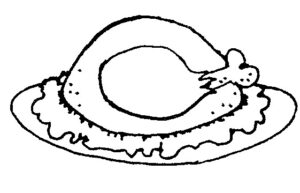Do you treat every day like a holiday?
Do you treat every day like a holiday?
Sounds like a beautiful idea, doesn’t it, to have every day be like a holiday? Who doesn’t want every day full of delight, joy, and wonder? After all, it would undoubtedly include delicious food, beautiful decor, rich colors, loved ones’ gathered, rituals, gifts, favorite movies, and games.
With all these delightful things, who wouldn’t love a daily holiday?
I asked my husband what he thought it would mean if every day was like a holiday. He replied, “Sounds like it could end up with overeating every day, excess consumption of stuff, and unmet expectations!”
Suddenly the idea of every day being a holiday didn’t sound desirous – who wants to over-consume and have their expectations unmet? That would be disappointing indeed!
And yet, that’s what we do almost every day. We overeat, over-consume, and set unbearably high expectations of ourselves and others.
 Let’s use Thanksgiving as an example since it is only a few days away. If we look back in history, it originated as a day to honor and celebrate the end of the growing season and enjoy the harvest – to share that harvest with others. The overriding theme was to give thanks and gratitude. Although it was a day to celebrate the fullness of the harvest, which was not always plentiful, it was still a day meant for us to gather and celebrate.
Let’s use Thanksgiving as an example since it is only a few days away. If we look back in history, it originated as a day to honor and celebrate the end of the growing season and enjoy the harvest – to share that harvest with others. The overriding theme was to give thanks and gratitude. Although it was a day to celebrate the fullness of the harvest, which was not always plentiful, it was still a day meant for us to gather and celebrate.
The Thanksgiving meal was simple and plain and included whatever came from the harvest, the land, or what others shared. It was much slimmer pickings than the Thanksgivings of today.
Compared to today, the traditional Thanksgiving has morphed into a dinner that includes any number of dishes: turkey, stuffing, mashed potatoes, candied yams, green bean casserole, a Jell-O mold, freshly made bread, cranberry sauce, and pumpkin pie (to name but a few dishes). No longer is the meal a simple or plain affair. Instead, it has become a day where we set aside any plan to restrict ourselves as we pile our plates high with food and eat it all.
How often have we excused ourselves from the Thanksgiving table and said, “Oh gosh, I’m stuffed. I couldn’t possibly eat another bite! I won’t need to eat for a week.” Yet somehow, we make room for the pumpkin and pecan pie.
We often rush through the meal, and as a result, the hours spent in the kitchen with preparations and clean-up take longer than the actual act of eating the meal.
 The dirty dishes, pots, and pans are piled high, and few guests help clean up. Instead, most of them lay around almost comatose, either napping or watching television – a football game or two, and others might play a card or board game to pass the time.
The dirty dishes, pots, and pans are piled high, and few guests help clean up. Instead, most of them lay around almost comatose, either napping or watching television – a football game or two, and others might play a card or board game to pass the time.
Oh, and let’s not forget the cost, time, and effort taken to grocery shop, decorate inside and out, set a beautiful table, manage the guest list, and who might bring something to share.
It makes you stop and think, doesn’t it, about the idea of every day being like a holiday?
The shocking fact is we Americans have been doing this since the late 1940s – living each day as if it is a holiday. We eat as if it is Thanksgiving every day. We decorate and buy stuff as if we’re hosting an annual gathering or party every day. We expect more and more of ourselves each day to meet the ideal of a successful, abundant life.
The mantra is – life is better with more. But more of what?
In the article entitled The Basics by More Is Better Than Less, A simple economics perspective on life, current events, and economics itself, they propose three basic assumptions about human behavior. (www.moreisbetterthanless.com/the-basics)
- People aren’t stupid. Giving them the benefit of the doubt, people behave in ways they think will make them happier.
- More is better. Yes, there are things that people don’t like, and more of that is not better. But whatever thing a person might value, you can safely assume that they believe more is better than less.
- More more is less better. People generally prefer more of something (good) to less; but the more of it they have, the less valuable it becomes. So while more might be better, we have to allow for the fact that once they have some more, they may not want as much more–especially if it comes at the cost of having less of something else.
They conclude by saying – “Put those three simple “rules of economics” together, and you have a pretty powerful toolkit for understanding incentives.”
Assumption #3 speaks volumes that we wouldn’t enjoy each day being like a holiday. It would be too much of the same thing. And we humans get bored with the “ho-hum” of sameness.
What if we exclude all the trappings, excesses, and expectations of the holiday and simply enjoy each day for whatever it brings? Now that, to me, is a holiday I’d enjoy experiencing each day.

Article by Joan Silva published in the monthly Crockett Signal magazine.
Novemmber 2022 Issue.